Unit 5 第一课时 Section A(1a-2d)课件【大单元教学】人教版七年级英语上册Unit 5 Do you have a soccer ball
文档属性
| 名称 | Unit 5 第一课时 Section A(1a-2d)课件【大单元教学】人教版七年级英语上册Unit 5 Do you have a soccer ball | 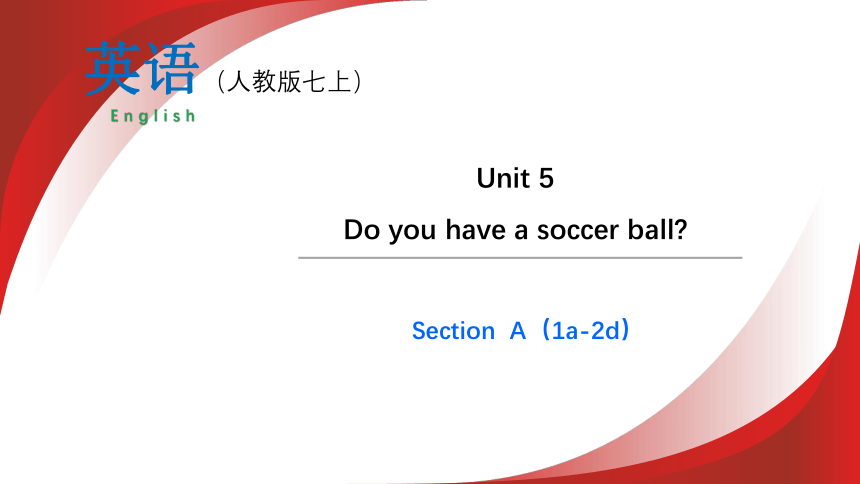 | |
| 格式 | pptx | ||
| 文件大小 | 11.1MB | ||
| 资源类型 | 试卷 | ||
| 版本资源 | 人教新目标(Go for it)版 | ||
| 科目 | 英语 | ||
| 更新时间 | 2023-09-21 12:40:24 | ||
图片预览

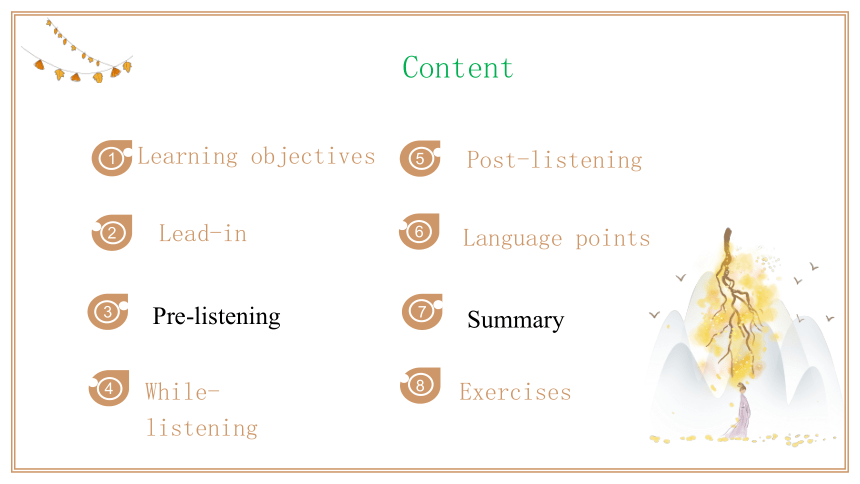
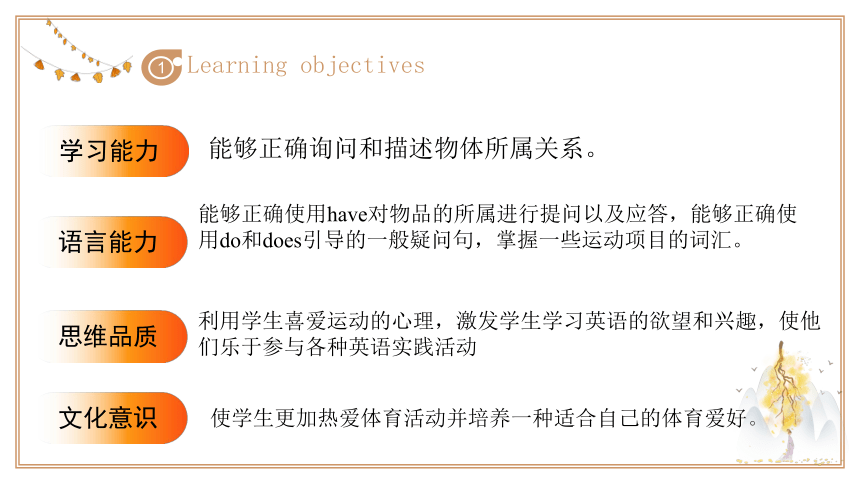
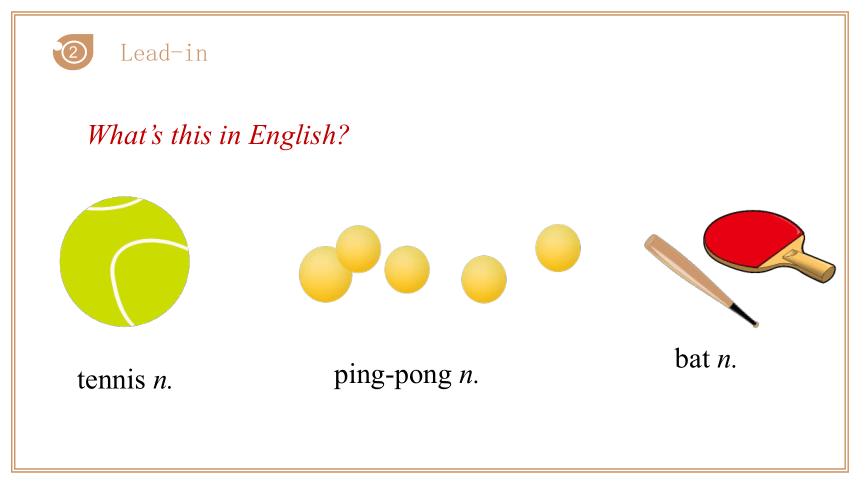
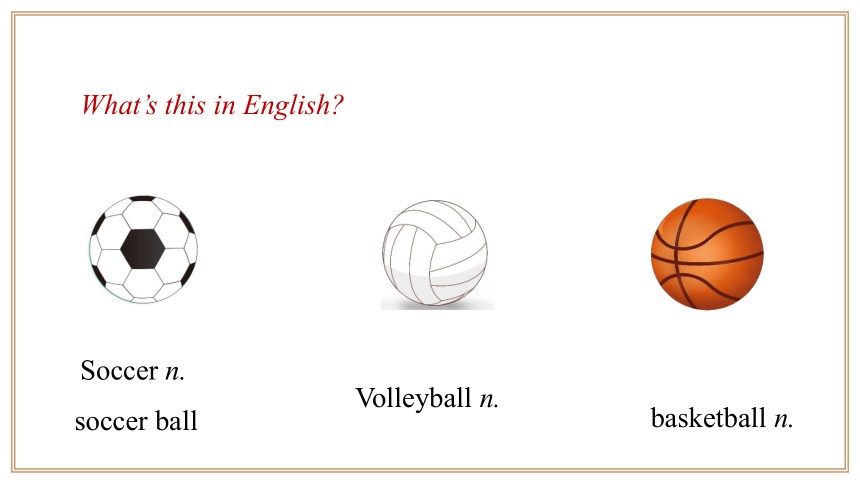
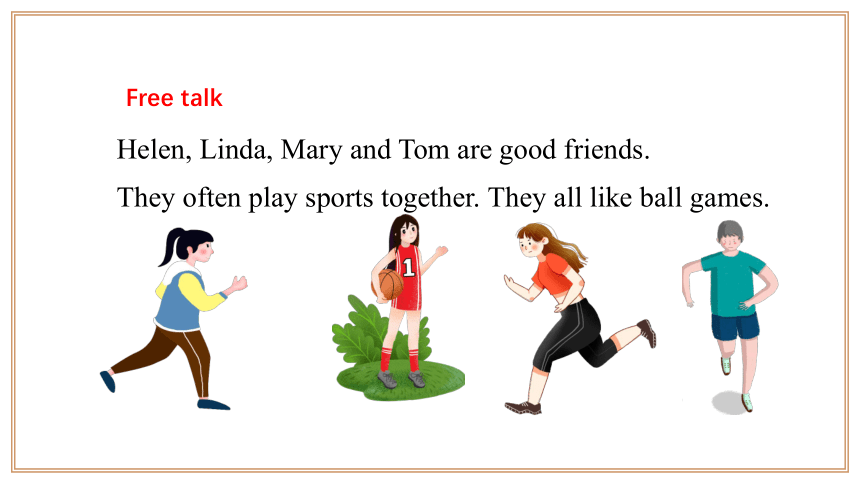
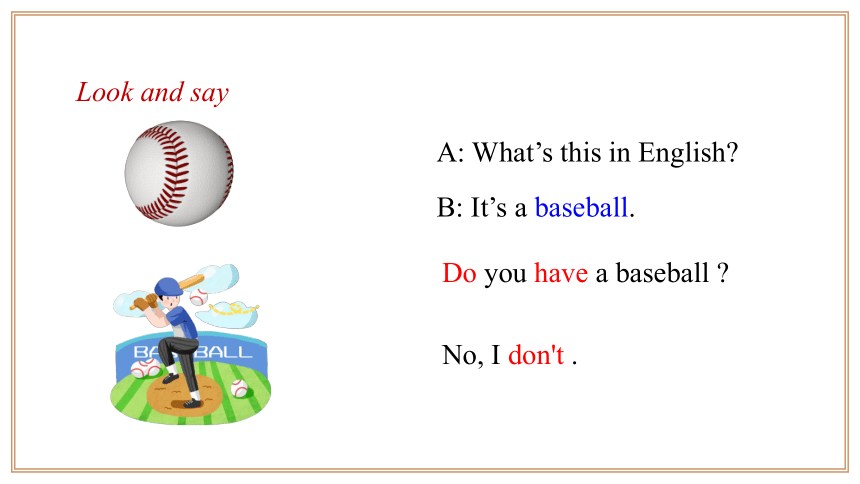
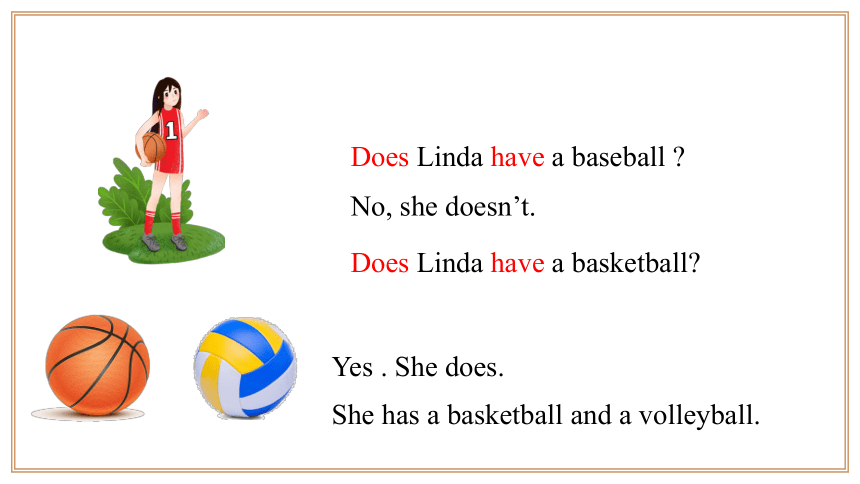
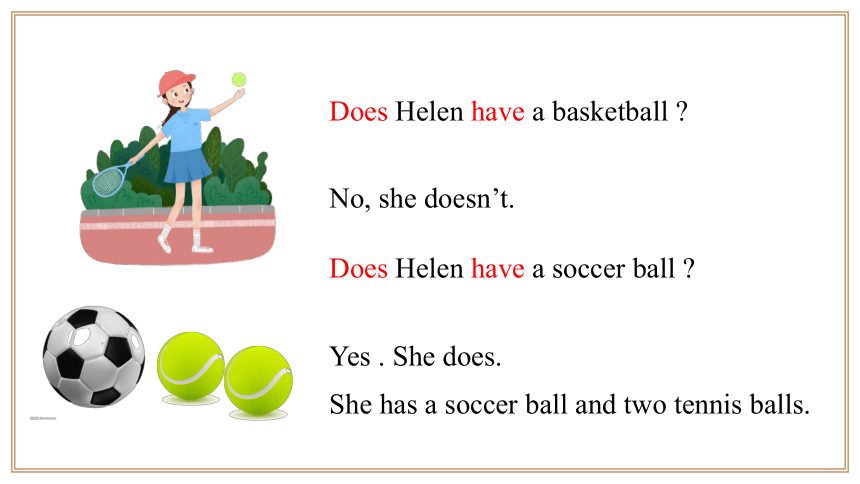
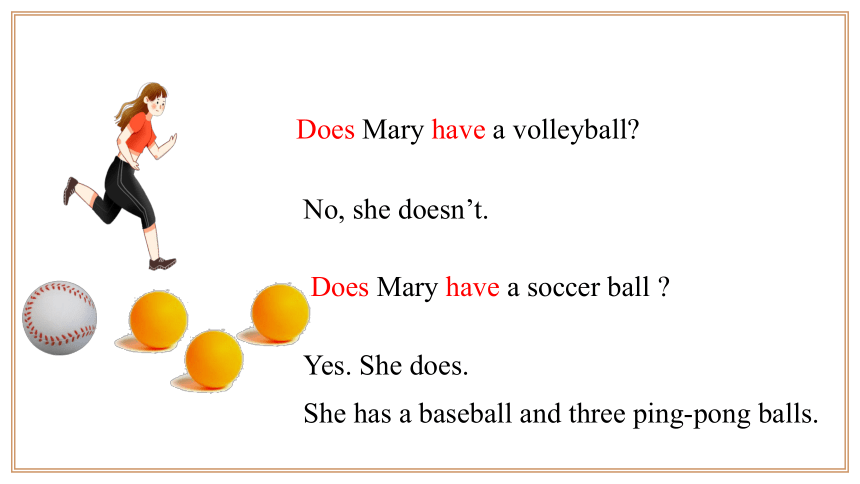
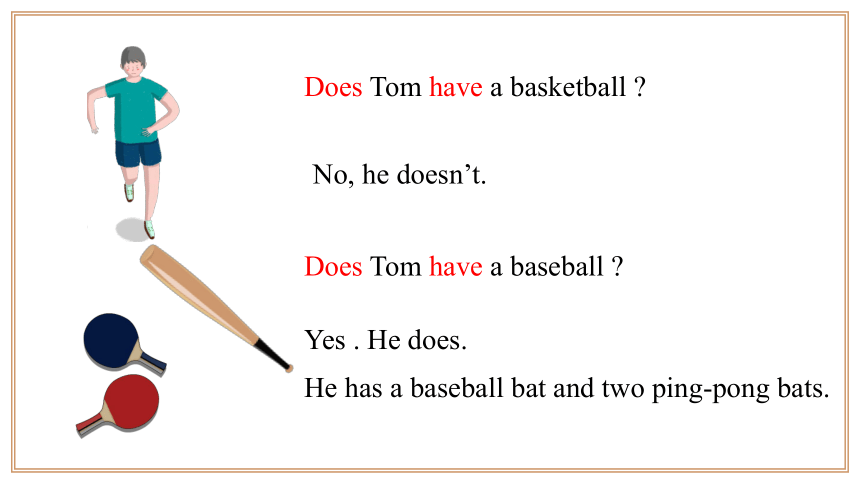
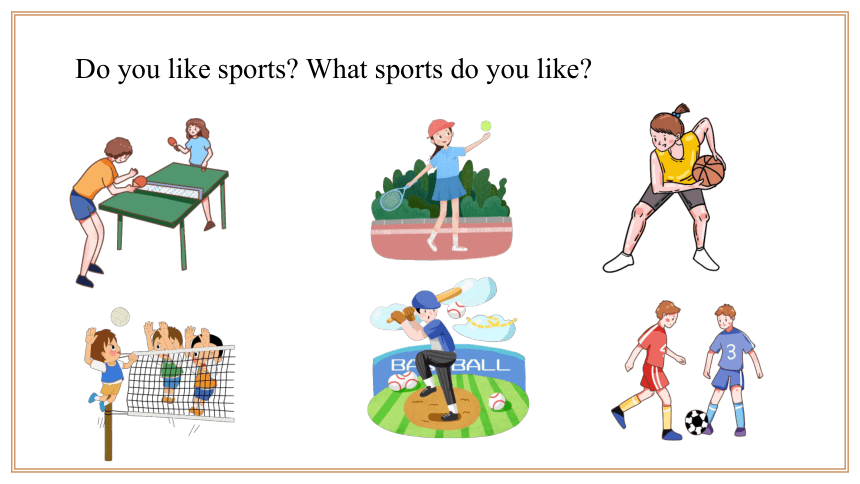
文档简介
(共42张PPT)
Section A(1a-2d)
英语(人教版七上)
English
Unit 5
Do you have a soccer ball
Lead-in
1
2
Pre-listening
3
While-listening
4
Content
Post-listening
5
Language points
6
Summary
7
Exercises
8
Learning objectives
能够正确使用have对物品的所属进行提问以及应答,能够正确使用do和does引导的一般疑问句,掌握一些运动项目的词汇。
使学生更加热爱体育活动并培养一种适合自己的体育爱好。
文化意识
语言能力
思维品质
学习能力
利用学生喜爱运动的心理,激发学生学习英语的欲望和兴趣,使他们乐于参与各种英语实践活动
1
Learning objectives
能够正确询问和描述物体所属关系。
tennis n.
ping-pong n.
bat n.
What’s this in English
Lead-in
2
Soccer n.
basketball n.
Volleyball n.
soccer ball
What’s this in English
Helen, Linda, Mary and Tom are good friends.
They often play sports together. They all like ball games.
Free talk
A: What’s this in English
B: It’s a baseball.
Look and say
Do you have a baseball
No, I don't .
Yes . She does.
She has a basketball and a volleyball.
Does Linda have a baseball
No, she doesn’t.
Does Linda have a basketball
Yes . She does.
She has a soccer ball and two tennis balls.
Does Helen have a basketball
No, she doesn’t.
Does Helen have a soccer ball
Yes. She does.
She has a baseball and three ping-pong balls.
Does Mary have a volleyball
No, she doesn’t.
Does Mary have a soccer ball
Yes . He does.
He has a baseball bat and two ping-pong bats.
Does Tom have a basketball
No, he doesn’t.
Does Tom have a baseball
Do you like sports What sports do you like
1a
Match the words with the things in the picture.
1. tennis ball ____
2. ping-pong bat ____
3. soccer ball ____
4. volleyball ____
5. basketball ____
6. baseball bat ____
a
b
f
e
d
c
a
b
c
d
e
f
Pre-listening
3
—Do you have…
—Yes, I do. / No, I don’t.
Pre-listening
1b
Listen and circle the words you hear.
ping-pong bat soccer ball volleyball ping-pong ball
While-listening
4
Boy 1: Do you have a ping-pong bat
Boy 2: Yes, I do.
Boy 1: Do you have a ping-pong ball
Boy 2: No, I don’t.
Listen and follow.
一般疑问句用升调,答语用降调。
Practice the conversation with your partner. Then ask and answer questions about the things in the picture.
1c
A: Do you have a ping-pong bat
B: Yes, I do.
A: Do you have a ping-pong ball
B: No, I don’t.
Role-play
Do you have a soccer ball
No, I don’t.
Do you have a volleyball
Yes, I do.
Language points
1. a ping-pong bat (教材P25 1a)
ping-pong作不可数名词,指“乒乓球运动”,表示“乒乓球运动中的球” 要用ping-pong ball。此外, table tennis也表示“乒乓球运动”。
I like playing ping-pong. I have two ping-pong balls and a ping-pong bat.
我喜欢打乒乓球。我有两个乒乓球和一个乒乓球拍。
ping-pong n. 乒乓球
bat n. 球棒;球拍
bat作名词, 还有“蝙蝠”的意思。
2. Do you have a ping-pong bat (教材P25 图片文字)
1) do在此处是助动词,没有实际意义,主要用于构成行为动词的疑问句或否定句。第三人称单数形式为does。
Do you go to school at 7:30 你七点半去上学吗?
Do aux. v. & v. 用于构成否定句和疑问句; 做; 干
I do my homework after dinner. 晚饭后我做家庭作业。
句式剖析:本句含行为动词have的一般现在时的一般疑问句, 其构成为: Do/ Does + 主语+ have + 宾语?
2) do还可作行为动词, 意为“做;干”。
have作及物动词,意为“有”,其第三人称单数形式是has。
I have a red bike. She has a blue one.
我有一辆红色自行车。她有一辆蓝色自行车。
have v.有
There is a bike in the yard. 院子里有一辆自行车。
have 表示“拥有”, 强调所属关系, 意为“某人有某物”。
there be 强调存在关系, 意为“某地有某人/ 某物”。
易混辨析: have 与 there be
Look at the first picture, we can see three girls. What’s the girl’s name in the middle
Look at the second picture, we can see two boys. What’s the boy’s name on the right
Look at the fourth picture, we can see two boys. What’s the boy’s name on the right
Look at the third picture, we can see two boys. What’s the boy’s name on the right
Listen to the conversations and number the pictures [1-4].
2a
1
3
4
2
While-listening
4
Listen again. Match the pictures in 2a with the balls.
2b
1
3
2
4
While-listening
4
Read the conversations in pairs.
Conversation 1
Bob: Do you have a soccer ball, Paul
Paul: No, I don't.
Bob: Does your brother Alan have one
Paul: Yes, he does.
Conversation 2
John: Hi, Mike.
Mike: Hi, John.
John: I want to play basketball. Do you have a basketball
Mike: Yes, I do.
John: Great!
Read the conversations in pairs.
Conversation 3
Jane: Hi, Sally.
Sally: Hi, Jane.
Jane: Sally, this is my friend, Anna.
Sally: Hi, Anna. Nice to meet you.
Anna: Nice to meet you, Sally.
Sally: Let's play tennis. Do you have a tennis ball, Jane
Jane: Sorry, I don't.
Conversation 4
Frank: Do you have a volleyball, Dale
Dale: No, I don't. But my brother does. Let's go and find him.
Ask and answer questions about the people in 2a.
2c
Does Jane have a tennis ball
No, she doesn't.
Post-listening
5
A: Do you have a soccer ball
B: Yes. I do.
A: Where is the soccer ball
B: It’s on the floor.
Pre-listening
Look at the picture.
Guess what they are talking about.
Let’s see whether your guess is right.
Read the conversation.
2d
Cindy: Hey, Helen, let's go! We're late!
Helen: OK.
Cindy: Do you have the baseball
Helen: Yes, I do. It's in my bag.
Cindy: And where's our baseball bat
Helen: Bill has it.
Cindy: Oh, yeah. And do you have your jacket
Helen: Oh, no, I don't. It's on the chair. Let me get it.
Cindy: And your hat, too!
Helen: OK, I have my jacket and hat. Let's go!
Listen and role-play the conversation.
2d
Cindy: Hey, Helen, let's go! We're late!
Helen: OK.
Cindy: Do you have the baseball
Helen: Yes, I do. It's in my bag.
Cindy: And where's our baseball bat
Helen: Bill has it.
Cindy: Oh, yeah. And do you have your jacket
Helen: Oh, no, I don't. It's on the chair. Let me get it.
Cindy: And your hat, too!
Helen: OK, I have my jacket and hat. Let's go!
咱们走吧!
我们迟到了!
我去拿(它)。
be late for……迟到
get v. 去取(或带来);得到
Language points
1. Hey, Helen, let's go! (教材P26 2d)
Let's... 咱们……吧。
该句型常用于提出建议或请求对方与自己一起做某事,Let's后接动词原形。
肯定回答:OK./All right./That sounds good./Good idea./...
否定回答:Sorry, I... 对不起,我……
【易混辨析】let's与let us
let作动词,常用结构 let sb. do sth. 意为“让某人做某事”。其中sb.要用人称代词的宾格形式,do要用动词原形。
Let me help you. 让我帮你吧。
let v. 允许;让
us pron. (we的宾格)我们
us是人称代词we的宾格形式,一般放在谓语动词或介词后面作宾语。主格人称代词we一般放句首作主语。
She gives us a picture. 她赠给我们一幅画。
We are good friends. 我们是好朋友。
go作动词,其反义词为come “来”。go 常用于“go to+地点名词”或“go+地点副词” 结构。
My brother goes to school by bike every morning.
我哥哥每天早晨骑自行车去上学。
go v. 去;走
Let’s go home. 咱们回家吧。
2. We are late!
be late “迟到”,一般其后跟介词“for” 表示“做某事迟到”。
be late for 做..事情迟到
比如:
be late for class 上课迟到
be late for meeting 开会迟到
be late for dinner 晚餐迟到了
1.We have learnt to identify different kinds of balls
2.We have learnt to talk about ownership
3. We have learnt some key words and useful expressions
Summary
7
1.I got up late, ____ I didn’t have breakfast. ___luckily I caught the first bus.
A. but; And B. so; So C. and; And D. so; But
2.Let’s______ them to play______ basketball.
A. to join, / B. to join, the C. join, the D. join, /
3. Hurry up (快点) , Mary! We’re _______!
A. late B. great C. good D. tidy
4.I like playing soccer, ______ my father doesn’t.
A.and B.but C.well D.too
5.—________ Lily have a nice and tidy room
—No,she ________.
A. Do;don't B.Does;doesn’t C.Do;doesn't D.Does;don't
D
D
B
B
A
一、单项选择
Exercises
8
二、根据句意、首字母、或汉语提示写出所缺的单词
1.Do you (有) a soccer ball
2.This (排球) is Linda’s.
3.Let’s (去) to the park after school.
4.Does your brother have a (篮球)
5.—D he have a ping-pong bat
—Yes, he has a ping-pong bat.
6.I have a soccer b . Please play soccer with me.
7.My family and I are in Baotou, Inner Mongolia. W are very happy.
8.Linda, my hat is on the desk. Can you g it for me
have
at
go
volleyball
basketball
oes
e
et
三、补全对话
请根据对话内容,从方框内所给的选项中选出能填入空白处的最佳选项。选项中有两项为多余项。
[David and Simon are brothers. David wants to borrow(借) a pen from Simon. ]
David: Morning, Simon!
Simon: Morning, David!
David: 1.
Simon: Yes, you can. I think it is on my cabinet(储藏柜).
David: A radio, a model UFO and a pencil are on your cabinet. 2.
Simon: Is it on my sofa
David: No, it isn’t. 3.
Simon: Oh, it must be on the top shelf(最上面的架子).
David: Er… I can’t find it on the top shelf, but I find it on the shelf below. 4.
Simon: Haha. Here it is.
David: 5.
Simon: You’re welcome.
David: But I want to say that your room is really not tidy.
A. What color is it
B. But the pen isn’t.
C. Thank you, Simon.
D. How much is the pen
E. Can I borrow your pen
F. I can see a ping-pong bat on the sofa.
G. Two books and a model plane are on it, too.
【答案】EBFGC
全力以赴,绽放未来
Go All Out, Bloom the Future
谢
谢
Section A(1a-2d)
英语(人教版七上)
English
Unit 5
Do you have a soccer ball
Lead-in
1
2
Pre-listening
3
While-listening
4
Content
Post-listening
5
Language points
6
Summary
7
Exercises
8
Learning objectives
能够正确使用have对物品的所属进行提问以及应答,能够正确使用do和does引导的一般疑问句,掌握一些运动项目的词汇。
使学生更加热爱体育活动并培养一种适合自己的体育爱好。
文化意识
语言能力
思维品质
学习能力
利用学生喜爱运动的心理,激发学生学习英语的欲望和兴趣,使他们乐于参与各种英语实践活动
1
Learning objectives
能够正确询问和描述物体所属关系。
tennis n.
ping-pong n.
bat n.
What’s this in English
Lead-in
2
Soccer n.
basketball n.
Volleyball n.
soccer ball
What’s this in English
Helen, Linda, Mary and Tom are good friends.
They often play sports together. They all like ball games.
Free talk
A: What’s this in English
B: It’s a baseball.
Look and say
Do you have a baseball
No, I don't .
Yes . She does.
She has a basketball and a volleyball.
Does Linda have a baseball
No, she doesn’t.
Does Linda have a basketball
Yes . She does.
She has a soccer ball and two tennis balls.
Does Helen have a basketball
No, she doesn’t.
Does Helen have a soccer ball
Yes. She does.
She has a baseball and three ping-pong balls.
Does Mary have a volleyball
No, she doesn’t.
Does Mary have a soccer ball
Yes . He does.
He has a baseball bat and two ping-pong bats.
Does Tom have a basketball
No, he doesn’t.
Does Tom have a baseball
Do you like sports What sports do you like
1a
Match the words with the things in the picture.
1. tennis ball ____
2. ping-pong bat ____
3. soccer ball ____
4. volleyball ____
5. basketball ____
6. baseball bat ____
a
b
f
e
d
c
a
b
c
d
e
f
Pre-listening
3
—Do you have…
—Yes, I do. / No, I don’t.
Pre-listening
1b
Listen and circle the words you hear.
ping-pong bat soccer ball volleyball ping-pong ball
While-listening
4
Boy 1: Do you have a ping-pong bat
Boy 2: Yes, I do.
Boy 1: Do you have a ping-pong ball
Boy 2: No, I don’t.
Listen and follow.
一般疑问句用升调,答语用降调。
Practice the conversation with your partner. Then ask and answer questions about the things in the picture.
1c
A: Do you have a ping-pong bat
B: Yes, I do.
A: Do you have a ping-pong ball
B: No, I don’t.
Role-play
Do you have a soccer ball
No, I don’t.
Do you have a volleyball
Yes, I do.
Language points
1. a ping-pong bat (教材P25 1a)
ping-pong作不可数名词,指“乒乓球运动”,表示“乒乓球运动中的球” 要用ping-pong ball。此外, table tennis也表示“乒乓球运动”。
I like playing ping-pong. I have two ping-pong balls and a ping-pong bat.
我喜欢打乒乓球。我有两个乒乓球和一个乒乓球拍。
ping-pong n. 乒乓球
bat n. 球棒;球拍
bat作名词, 还有“蝙蝠”的意思。
2. Do you have a ping-pong bat (教材P25 图片文字)
1) do在此处是助动词,没有实际意义,主要用于构成行为动词的疑问句或否定句。第三人称单数形式为does。
Do you go to school at 7:30 你七点半去上学吗?
Do aux. v. & v. 用于构成否定句和疑问句; 做; 干
I do my homework after dinner. 晚饭后我做家庭作业。
句式剖析:本句含行为动词have的一般现在时的一般疑问句, 其构成为: Do/ Does + 主语+ have + 宾语?
2) do还可作行为动词, 意为“做;干”。
have作及物动词,意为“有”,其第三人称单数形式是has。
I have a red bike. She has a blue one.
我有一辆红色自行车。她有一辆蓝色自行车。
have v.有
There is a bike in the yard. 院子里有一辆自行车。
have 表示“拥有”, 强调所属关系, 意为“某人有某物”。
there be 强调存在关系, 意为“某地有某人/ 某物”。
易混辨析: have 与 there be
Look at the first picture, we can see three girls. What’s the girl’s name in the middle
Look at the second picture, we can see two boys. What’s the boy’s name on the right
Look at the fourth picture, we can see two boys. What’s the boy’s name on the right
Look at the third picture, we can see two boys. What’s the boy’s name on the right
Listen to the conversations and number the pictures [1-4].
2a
1
3
4
2
While-listening
4
Listen again. Match the pictures in 2a with the balls.
2b
1
3
2
4
While-listening
4
Read the conversations in pairs.
Conversation 1
Bob: Do you have a soccer ball, Paul
Paul: No, I don't.
Bob: Does your brother Alan have one
Paul: Yes, he does.
Conversation 2
John: Hi, Mike.
Mike: Hi, John.
John: I want to play basketball. Do you have a basketball
Mike: Yes, I do.
John: Great!
Read the conversations in pairs.
Conversation 3
Jane: Hi, Sally.
Sally: Hi, Jane.
Jane: Sally, this is my friend, Anna.
Sally: Hi, Anna. Nice to meet you.
Anna: Nice to meet you, Sally.
Sally: Let's play tennis. Do you have a tennis ball, Jane
Jane: Sorry, I don't.
Conversation 4
Frank: Do you have a volleyball, Dale
Dale: No, I don't. But my brother does. Let's go and find him.
Ask and answer questions about the people in 2a.
2c
Does Jane have a tennis ball
No, she doesn't.
Post-listening
5
A: Do you have a soccer ball
B: Yes. I do.
A: Where is the soccer ball
B: It’s on the floor.
Pre-listening
Look at the picture.
Guess what they are talking about.
Let’s see whether your guess is right.
Read the conversation.
2d
Cindy: Hey, Helen, let's go! We're late!
Helen: OK.
Cindy: Do you have the baseball
Helen: Yes, I do. It's in my bag.
Cindy: And where's our baseball bat
Helen: Bill has it.
Cindy: Oh, yeah. And do you have your jacket
Helen: Oh, no, I don't. It's on the chair. Let me get it.
Cindy: And your hat, too!
Helen: OK, I have my jacket and hat. Let's go!
Listen and role-play the conversation.
2d
Cindy: Hey, Helen, let's go! We're late!
Helen: OK.
Cindy: Do you have the baseball
Helen: Yes, I do. It's in my bag.
Cindy: And where's our baseball bat
Helen: Bill has it.
Cindy: Oh, yeah. And do you have your jacket
Helen: Oh, no, I don't. It's on the chair. Let me get it.
Cindy: And your hat, too!
Helen: OK, I have my jacket and hat. Let's go!
咱们走吧!
我们迟到了!
我去拿(它)。
be late for……迟到
get v. 去取(或带来);得到
Language points
1. Hey, Helen, let's go! (教材P26 2d)
Let's... 咱们……吧。
该句型常用于提出建议或请求对方与自己一起做某事,Let's后接动词原形。
肯定回答:OK./All right./That sounds good./Good idea./...
否定回答:Sorry, I... 对不起,我……
【易混辨析】let's与let us
let作动词,常用结构 let sb. do sth. 意为“让某人做某事”。其中sb.要用人称代词的宾格形式,do要用动词原形。
Let me help you. 让我帮你吧。
let v. 允许;让
us pron. (we的宾格)我们
us是人称代词we的宾格形式,一般放在谓语动词或介词后面作宾语。主格人称代词we一般放句首作主语。
She gives us a picture. 她赠给我们一幅画。
We are good friends. 我们是好朋友。
go作动词,其反义词为come “来”。go 常用于“go to+地点名词”或“go+地点副词” 结构。
My brother goes to school by bike every morning.
我哥哥每天早晨骑自行车去上学。
go v. 去;走
Let’s go home. 咱们回家吧。
2. We are late!
be late “迟到”,一般其后跟介词“for” 表示“做某事迟到”。
be late for 做..事情迟到
比如:
be late for class 上课迟到
be late for meeting 开会迟到
be late for dinner 晚餐迟到了
1.We have learnt to identify different kinds of balls
2.We have learnt to talk about ownership
3. We have learnt some key words and useful expressions
Summary
7
1.I got up late, ____ I didn’t have breakfast. ___luckily I caught the first bus.
A. but; And B. so; So C. and; And D. so; But
2.Let’s______ them to play______ basketball.
A. to join, / B. to join, the C. join, the D. join, /
3. Hurry up (快点) , Mary! We’re _______!
A. late B. great C. good D. tidy
4.I like playing soccer, ______ my father doesn’t.
A.and B.but C.well D.too
5.—________ Lily have a nice and tidy room
—No,she ________.
A. Do;don't B.Does;doesn’t C.Do;doesn't D.Does;don't
D
D
B
B
A
一、单项选择
Exercises
8
二、根据句意、首字母、或汉语提示写出所缺的单词
1.Do you (有) a soccer ball
2.This (排球) is Linda’s.
3.Let’s (去) to the park after school.
4.Does your brother have a (篮球)
5.—D he have a ping-pong bat
—Yes, he has a ping-pong bat.
6.I have a soccer b . Please play soccer with me.
7.My family and I are in Baotou, Inner Mongolia. W are very happy.
8.Linda, my hat is on the desk. Can you g it for me
have
at
go
volleyball
basketball
oes
e
et
三、补全对话
请根据对话内容,从方框内所给的选项中选出能填入空白处的最佳选项。选项中有两项为多余项。
[David and Simon are brothers. David wants to borrow(借) a pen from Simon. ]
David: Morning, Simon!
Simon: Morning, David!
David: 1.
Simon: Yes, you can. I think it is on my cabinet(储藏柜).
David: A radio, a model UFO and a pencil are on your cabinet. 2.
Simon: Is it on my sofa
David: No, it isn’t. 3.
Simon: Oh, it must be on the top shelf(最上面的架子).
David: Er… I can’t find it on the top shelf, but I find it on the shelf below. 4.
Simon: Haha. Here it is.
David: 5.
Simon: You’re welcome.
David: But I want to say that your room is really not tidy.
A. What color is it
B. But the pen isn’t.
C. Thank you, Simon.
D. How much is the pen
E. Can I borrow your pen
F. I can see a ping-pong bat on the sofa.
G. Two books and a model plane are on it, too.
【答案】EBFGC
全力以赴,绽放未来
Go All Out, Bloom the Future
谢
谢
同课章节目录
- starters 预备篇(2012秋审查)
- Unit 1 Good morning !
- Unit 2 What’s this in English?
- Unit 3 What color is it ?
- Unit 1 My name's Gina.
- Section A
- Section B
- Unit 2 This is my sister.
- Section A
- Section B
- Unit 3 Is this your pencil?
- Section A
- Section B
- Unit 4 Where's my schoolbag?
- Section A
- Section B
- Unit 5 Do you have a soccer ball?
- Section A
- Section B
- Unit 6 Do you like bananas?
- Section A
- Section B
- Unit 7 How much are these socks?
- Section A
- Section B
- Unit 8 When is your birthday?
- Section A
- Section B
- Unit 9 My favorite subject is science.
- Section A
- Section B
